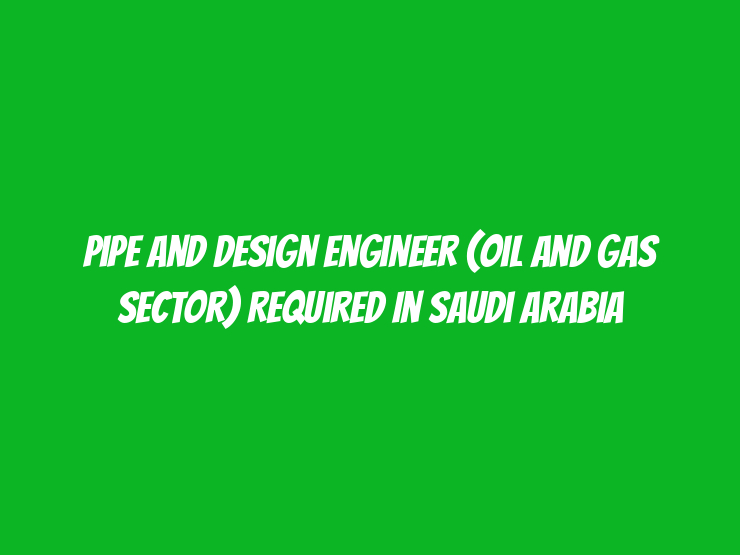A Pipe and Design Engineer in the oil and gas industry specializes in designing, analyzing, and optimizing piping systems for various projects, including exploration, production, and refining operations. This role requires expertise in engineering principles, industry standards, and advanced software tools to create efficient and safe piping designs that meet operational and regulatory requirements. The engineer collaborates with multidisciplinary teams to ensure project success and integrity.
| Salary | 4000 – 5000 SR |
| Experience | 2 – 5 years |
| Location | Saudi Arabia |
| Qualification | Bachelor Degree |
| Posted | 11 December 2024 |
| Job Type | Full Time |
| Posted by | Habeebi Recruiter |
| last date to apply | apply within 15 day |
Key Responsibilities
1. Piping System Design and Layout
The Pipe and Design Engineer develops detailed designs and layouts for piping systems, ensuring they meet the project’s technical specifications and operational needs. This involves selecting appropriate materials, pipe sizes, and configurations to achieve optimal performance.
2. Stress Analysis and Structural Integrity
The engineer conducts stress analysis to assess the mechanical strength and durability of piping systems under various conditions, such as pressure, temperature, and vibration. They ensure designs comply with industry standards and mitigate risks of failure.
3. Preparing Technical Drawings and Documentation
Using software like AutoCAD, SolidWorks, or PDMS, the engineer creates detailed technical drawings, isometric views, and schematics. These documents serve as blueprints for construction and maintenance teams.
4. Compliance with Industry Standards
The engineer ensures all designs adhere to relevant codes and standards, such as ASME, API, and ISO, as well as environmental and safety regulations specific to the oil and gas sector.
5. Collaboration with Project Teams
The Pipe and Design Engineer works closely with project managers, process engineers, and construction teams to align designs with overall project objectives. They provide technical support and guidance throughout the project lifecycle.
6. Cost Estimation and Resource Planning
The engineer contributes to budgeting and resource planning by estimating material costs, labor, and timelines for piping-related activities. They identify cost-saving opportunities without compromising quality.
7. Site Inspections and Supervision
During the construction or installation phase, the engineer conducts site visits to ensure the proper implementation of designs. They troubleshoot issues, verify alignment with specifications, and ensure quality control.
8. Modifications and Optimization
The engineer evaluates existing piping systems and recommends modifications to improve efficiency, safety, or compliance. This includes retrofitting older systems or integrating new technologies.
9. Risk Assessment and Safety Analysis
Ensuring safety is paramount in the oil and gas industry. The engineer performs risk assessments, identifies potential hazards, and incorporates mitigation measures into the design process.
Essential Skills and Qualifications
- Educational Background: A degree in mechanical engineering, civil engineering, or a related field. Additional certifications in piping design or oil and gas engineering are advantageous.
- Technical Proficiency: Expertise in design software (AutoCAD, SolidWorks, or PDMS) and stress analysis tools (CAESAR II, Ansys).
- Knowledge of Standards: Familiarity with ASME, API, ISO, and other industry-specific codes.
- Analytical Thinking: Ability to solve complex engineering problems and optimize designs.
- Attention to Detail: Ensuring accuracy and precision in designs and documentation.
- Team Collaboration: Strong interpersonal skills to work effectively with multidisciplinary teams.
- Project Management: Skills in managing schedules, resources, and deliverables.
Work Environment
A Pipe and Design Engineer typically splits their time between office-based design work and on-site inspections. The role may involve travel to oil and gas facilities, including offshore platforms or remote locations. The job requires adherence to strict safety protocols and may demand extended hours to meet project deadlines.
This position is ideal for engineers with a strong technical background, a focus on innovation, and a commitment to ensuring safety and efficiency in oil and gas operations.
How to apply:
Send your updated resume to our email:
Email: brilliantbosshr@gmail.com

